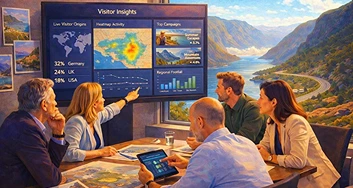At the #DTTT, we are bringing people together across the industry to help steer them through the crisis. In our podcast you will hear a range of industry perspectives, shared experiences and insights into the direct effects and impact of the crisis. Everyone has a different response and everyone is responding in different ways. The impact of this is far reaching, we know at the end of this many businesses will not survive, and there will be job losses. As an industry we have a huge challenge ahead of us to recover from this.
Listen to the full podcast 👇
In Week 1, we had cross sector contributions from Milan and Partners, Visit Greenland and Culture Trip amongst others. One thing that has come out of the call, is that the industry as a whole is very keen to share experiences, and industry-wide there is a huge sense of community and collaboration.
Uncertainty is driving industry collaboration
There is no clear end to this crisis. Normality will only return when the crisis is no longer a worldwide emergency and the economy returns to normal. DMOs in Italy are now reaching out to their NTOs to help regional and local DMOs with updated marketing intelligence. They want to be as informative as possible for their stakeholders. There is a general trend across the industry for increased sharing of data and intelligence between NTOs, local and regional DMOs and agencies. Data will help the industry to answer many questions going forward.
The economic impact is huge, as are the long-term consequences
This is a global economic problem and must be analysed from a global perspective. Business will either be postponed or go bust. DMOs in Italy are particularly vulnerable financially, mainly relying on public expenditure. There is the possibility for most DMOs that the private sector could take over, which could result in redefining the roles of DMOs and their scope of action.
DMOs have to re-strategise their communication plans
DMOs now have the time to conduct strategic reviews of their programs. Staying relevant and digital is a challenge for DMOs, with many trying to reinvent their digital presence. Many are aware that they have to be sensitive, and choose the right time to communicate with the right message. It is also important for DMOs to communicate the right message to residents. Every DMO must decide on a responsible message and manage this.
Providing guidance for tourists and local businesses is key
With many people still keen to visit destinations, DMOs are getting inundated with questions from tourists, particularly Visit Greenland. Visit Greenland’s focus is protecting their local businesses, and it is persuading tourists not to cancel, but to rebook for the following year. The message to tourists is to stay safe and stay away, but also that Visit Greenland is still open for business when the crisis is over.
People are staying optimistic about travel, but still reluctant to book
Surveys have revealed that many travellers have cancelled their travel plans for the next six weeks, but refrained from cancelling their summer travel plans. New bookings however, are not being made. Data has also shown that younger audiences are actually more nervous of COVID-19 and are more reluctant to travel than the older generation.
The first step to recovery will be the “Staycation” and focusing on the local population
If people must stay at home due to travel restrictions, they have a great opportunity to visit and discover their local regions and eventually the rest of their country. The “Staycation” approach will be a lifeline for local businesses as the industry begins to recover.





















